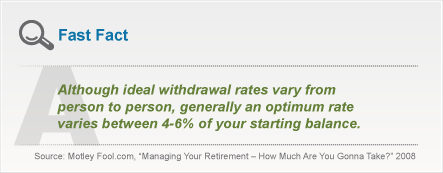Taking Sensible Distributions
The last thing you want is to deplete your retirement savings too early and leave yourself struggling later on in retirement. So how much should you withdraw every year? The answer depends on a few variables: how much you have saved, how much you need to withdraw and how you want to invest your savings in retirement.
A study conducted by three professors at Trinity University in San Antonio, Texas, investigated this question and provided a few intriguing answers:1
- For withdrawal periods longer than 15 years, an annual withdrawal rate exceeding 5% increases the probability of depleting savings early.
- For withdrawal periods shorter than 15 years, a withdrawal rate of 8-9% from a stock-dominated portfolio seems reasonable.
- Bonds increase the success rate for lower to mid-level withdrawal rates, but most retirees would benefit from a stock allocation of at least 50%.
- Retirees who want to adjust their withdrawals to keep pace with inflation must accept a considerably reduced withdrawal rate early on in retirement.
1 American Association of Individual Investors Journal, February 1998, and Motley Fool.com, "Managing Your Retirement – How Much Are You Gonna Take?" 2008.



